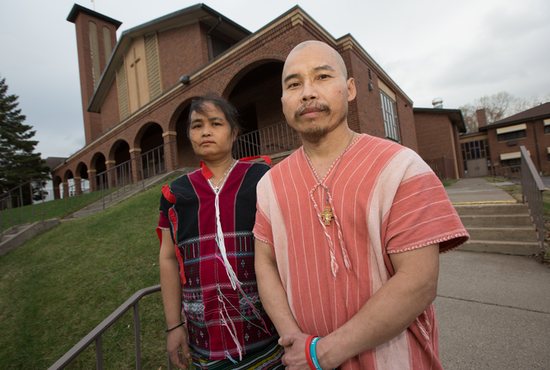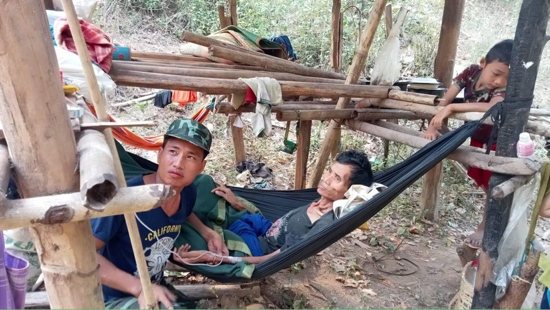
Karen, Karenni and Chin Catholic communities in Twin Cities ask for prayers, other support for those back home
Pah Chi was married for one week when the Burmese military first kidnapped, tortured and terrorized him.
In a process repeated several times due to sporadic violence in Myanmar, also known as Burma, before he and his wife fled the country in 2002, different bands of Burmese soldiers passing by his village forced him or others to do menial chores but let them go after about a month. Each time, they claimed their victims were resistance fighters, beat them and threatened to kill them while trying to make them confess, only to acknowledge or verify later that they were villagers and let them go. If those captured were found to be anti-government fighters, they were killed.
Burmese soldiers repeatedly raided villages. Men often fled in terror and hid in the jungle until they thought it was safe to return. Women villagers were often kidnapped and treated as slaves while the men were away, and their homes were burned down, Pah Chi said.
In Pah Chi’s case, as he unsuccessfully tried to escape from the soldiers, one of his uncles was shot and killed.
First kidnapped 33 years ago, Pah Chi is now 55 and a member of St. Casimir on the East Side of St. Paul. He said what he experienced is happening all over again, right now, in Myanmar. It is a cycle of ethnic and religious violence that began in 1948 when the country gained its independence from Great Britain and a brief World War II takeover by Japan. Violence has continued in some form ever since.
“I want to tell my story because this is not only happening right now,” Pah Chi, wearing a full-length tunic and sandals, told The Catholic Spirit through an interpreter after a Lenten Stations of the Cross at St. Patrick, also on St. Paul’s East Side.
“This happened 70 years ago (too). I want people to understand.”
International pressure is needed to bring peace to their country, said Pah Chi, and his 48-year-old wife, Clare, which is her confirmation name. The couple have 10 children and eight grandchildren. Both are members of the Catholic minority Karen in Buddhist-majority Myanmar. People must get the “Burmese military to stop this,” he said.

People can help
Franciscan Brothers of Peace Father Seraphim Wirth, a native of Sauk Rapids whose ministry includes acting as chaplain for the Karen community of about 75 Catholic families in St. Paul, said people can write to their representatives in Congress to raise awareness about the violence in Myanmar and seek international intervention. Pah Chi’s experience is similar to many others, Father Seraphim said.
People also can donate money through the St. Paul-based Franciscan Brothers of Peace, which has a network of trusted individuals who can make certain the donations reach people in need in Myanmar, Father Seraphim said. Checks to the Brothers marked for “Burma relief” can be sent to 1289 Lafond Ave., St. Paul, MN 55104. Pressing needs include food and rain tarps for people fleeing their villages, he said.
Most important, people can pray for peace, said Father Seraphim, who traveled with Pah Chi for three weeks last year in the region of Myanmar that has seen a great deal of the current violence. The Franciscan Brothers of Peace and the Karen community in the Archdiocese of St. Paul and Minneapolis have sponsored a school for internally displaced children in the Karen region of Burma. Father Seraphim made the trip in part to dedicate a chapel in that area, with permission from the local bishop. This year, Father Seraphim has kept in touch through a Wi-Fi connection that works best in the middle of the night in Burma. Recently people in that region and in the school fled into the jungle as military helicopters and jet fighters swooped in, strafing inhabited areas, he said.
“When I talked to the camp leader (in the jungle), he said, ‘Can you pray for the Burmese military, that they will change their hearts and stop attacking them?’”
Pah Chi and his wife, and all of the Karen people have relatives they worry about back in Myanmar, Father Seraphim said. Similar Catholic ethnic groups from Myanmar, including the Karenni and Chin, who have settled around the St. Bernard and St. Agnes neighborhoods in St. Paul, also worry about people back in their homeland, he said.
All of them pray for an end to the violence, Father Seraphim said, including at a March 13 prayer service at St. Patrick that centered on the turmoil in Myanmar and was led by Archbishop Bernard Hebda. About 120 people from the Karen, Karenni and Chin communities attended, praying a rosary for peace, taking time for adoration of the Eucharist and a reflection by the archbishop.
“I am grateful for the archbishop’s encouraging words to the people,” Father Seraphim said. “He gave a message of hope centered on Jesus Christ. It is clear that the archbishop has a heart full of compassion for the people of Myanmar.”
Father Seraphim said he echoes what Pah Chi said about the need for intervention in Myanmar.
“The international community needs to help by putting more pressure on the Burmese military,” Father Wirth said. “People living in bamboo homes can’t compete against fighter jets and helicopters shooting at them.”
BURSTS OF VIOLENCE
The latest burst of violence in Myanmar followed a military coup Feb. 1 that deposed the elected government of Aung San Suu Kyi. In the face of protests, junta-controlled soldiers and police have been widely seen by international observers as conducting indiscriminate brutality and deadly use of force.
More than 580 people have been killed in the turmoil, according to one estimate.
While Catholics in Myanmar observed Palm Sunday this year, many in the Buddhist-majority country were weeping at the funerals of more than 100 people killed by security forces the previous day, the Catholic News Service reported.
On Feb. 28, Sister Ann Nu Thawng, a member of the Sisters of St. Francis of Xavier, dropped to her knees in front of Myanmar security forces, media reports said, raised her hands and implored, “Don’t shoot, don’t kill the innocent. If you want, hit me.”
Shocked security forces stopped their advance. About 100 protesters were believed to have escaped from police because of the religious sister’s actions.



